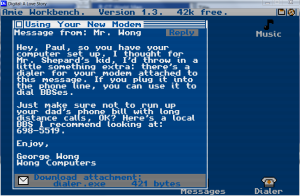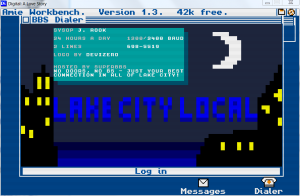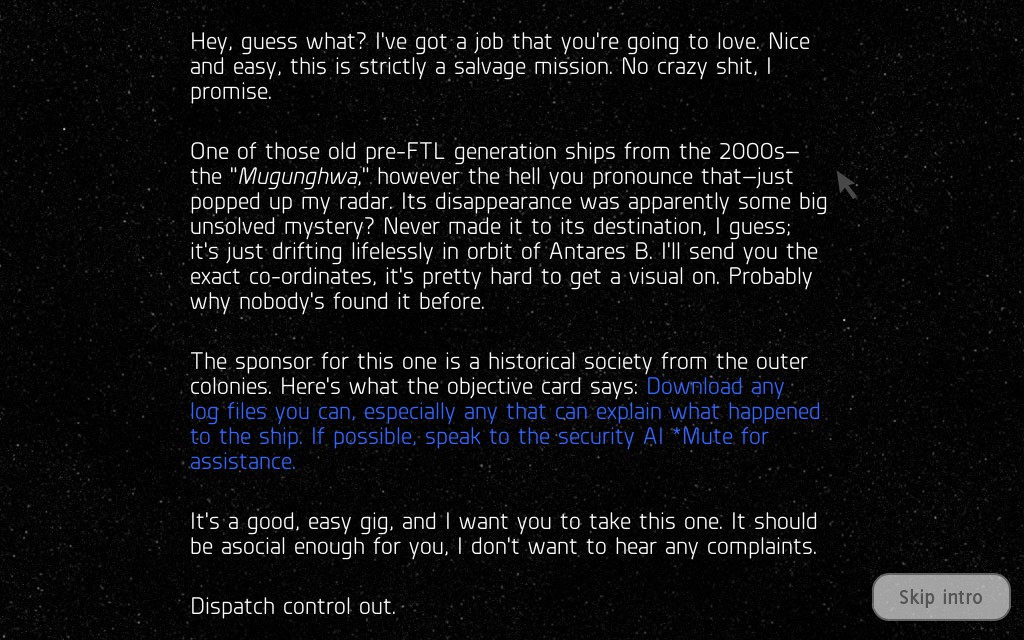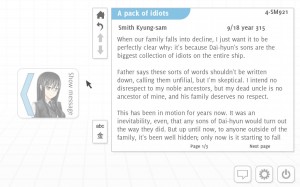- Storytelling in Games: An Introduction
- Storytelling in Games: “What’s it all about?” Or, the importance of gameplay mechanics
- Storytelling in Star Control II: Playing space detective
- An extraordinary life: storytelling in Fallout 3
- The price of heroism: storytelling in X-Com
- A history of heroes: storytelling in Valkyrie Profile 2: Silmeria
- Love, Hate, and Stories: The Visual Novels of Christine Love
To what heights – and depths – of emotion can we be moved by text in a game? This is the question posed by two of the best games I’ve played recently: Christine Love’s Digital: A Love Story and Analogue: A Hate Story.
Perhaps I shouldn’t call them games so much as I should call them interactive works of epistolary fiction, in which the player pieces together a story from documents and messages. The two titles contain very little in the way of abstract systems – apart from a couple of puzzles, there are no rules to be mastered here. This doesn’t mean the player is uninvolved! While both games rely on plenty of text, they also deploy that interactivity to good effect. They would not work in any other medium, something we’ll see with Digital.
Welcome to the twentieth century: Digital: A Love Story (2010)

The year is 1988. In Lake City, Ontario, a teenager has just acquired the gateway to a wider world: an Amie PC, a dial-up modem, and the phone number of a local bulletin board system. That teenager is your character, and BBSes such as Lake City Local are where Digital unfolds, one email and forum post at a time. Welcome to the Internet. Or, as the tagline of the game would have it, “welcome to the 20th century.”
Digital is the game that made Christine Love’s reputation, and it deserves every ounce of its renown. Not, perhaps, for the reason you’d think. There is a love story, as promised; but I wasn’t a huge fan. It felt rushed and a bit contrived, something that “had to happen” for the plot rather than being the outcome of character interaction. Rather, the triumph of Digital is the way in which it brings its setting alive.
At this point, I should clarify what I mean. Is Digital an authentic recreation of period BBSes? Apparently the answer is “yes”, but I’m not old enough to answer this firsthand. (In fact, neither is the creator – she hadn’t even been born in 1988!) But that’s not the important point. The point is that it feels like an authentic recreation of period BBSes. To spoil the first 60 seconds of the game:
1. I open my in-game email to see a message from the owner of the computer store where my character/ his parents bought the Amie. The message contains the phone number for my first BBS! Back in real life, I jot down the number in a notebook.

2. I open the Amie’s dialler program. It prompts me to enter a phone number; I manually type the one that I scribbled down.
3. The modem screeches – this sound I’m old enough to remember! I wait.
4. Success! I’m now connected, though not logged into, the Lake City Local BBS (pictured). I register a new account by typing “new”, then choose a password for myself.
5. The game is afoot! Now, to browse the messages on the BBS…
This is a ritual I’ll repeat time and again throughout the game. Every time I subsequently log into Lake City Local, I’ll have to go through steps 2-3, and then type in the correct password when I reach step 4. Why do this? Why make me type in the phone number, why make me wait for the modem to dial Lake City Local, why make me type in my password? Why not abstract all this out into a single shortcut, “Go to Lake City Local”? Answer: because doing things this way creates a sense of place. Every time we connected to the Internet before broadband, we had to wait for our modems to dial in. Every website where we register a distinct identity demands our password. So when I re-enact those rituals, it makes it that much easier for me to suspend my disbelief.
This is the brilliance of Digital – every bit of its experience is crafted to foster the illusion that yes, I really am a Gen X’er experiencing the online world of 1988. Each BBS splash screen welcomes us with glorious ANSI/ASCII art, while a little text box on the Amie desktop informs me I have a princely 42KB of memory free. The chiptune background music sounds like the beeps-and-boops I remember from the games of my childhood. Minor NPCs chatter about such contemporary topics as cyberpunk novels and the rise of Japan. And on it goes.
Home in on that paragraph, and the real love letter in Digital becomes visible. In bringing its online setting to life, Digital becomes something more: a celebration of the Internet, and of the communication – and community – it enables. Obviously, the game’s plot and premise would be impossible without the Net – this is a digital love story, after all! But it’s the incidental detail, the stuff that has little or nothing to do with the plot, that makes the tribute clear. It’s the distinct culture of each BBS you visit – just as you couldn’t mistake, say, Reddit and a university’s discussion board, you won’t mistake the friendly Lake City Local for some of the places you encounter later in the game. It’s the messages you read, and the characters who post them – you’ll encounter trolls, altruists, coteries of like-minded aficionados, and everything in between. It’s the friendships some of these characters have formed – relationships that existed long before the player character showed up, and that will hopefully go on long into the future. It all rings utterly true to me, and it’s just as satisfying to see a work that focuses on the brighter side of the Internet. As Love put it, this is “a cyberpunk story that’s romantic instead of gritty”, and the world could do with more of those.
There’s so much more I wish I could tell you about this game – but that I can’t. I wish I could go into detail about how my emotions rose and fell with subsequent acts of the game’s story. I wish I could tell you about how specific pieces from the soundtrack accentuated the highs and lows of specific scenes. I wish I could tell you everything that made this game so fun and funny – but I can’t without spoiling it. I can tell you Digital can be finished in 1-2 hours – long enough for you to get a good taste of its world, short enough for its quirky mechanics not to wear out their welcome. And I can tell you it’s freely available from the author’s site…
Interlude: Don’t take it personally, babe, it just ain’t your story (2011)
In between Analogue and Digital, Christine Love released Don’t take it personally, babe, it just ain’t your story:
A spiritual sequel of sorts to Digital: A Love Story, set in a prestigious private high school, and on the social networks of 2027.
Out of the three games that began with Digital, DTIPB is the most conventional – while you do read plenty of messages (in this case, the player character is a teacher and the messages are those his students leave on a social network), there’s also plenty of face-to-face interaction in the vein of a traditional visual novel. Unfortunately, it’s also the weakest of the three by far – I suspect it suffers from being done in one month (admittedly an impressive feat in itself) for visual novel challenge NaNoReNo. DTIPB’s mechanics/presentation lack the charm of Digital, and its story fizzles after initially promising an interesting take on privacy in the Facebook era.
Personally, I think DTIPB is most significant as an intermediate step in Christine Love’s work – DTIPB introduces the branching storyline that becomes prominent in Analogue, as well as having much more in the way of art than the bare-bones Digital. (If you’d like to take a look for yourself, DTIPB is also available for free, here.)
So what, then, of Analogue?
Do you just think you know something that I don’t? Analogue: A Hate Story (2012)

“No crazy shit”, hah. Tell that to me as I stare at my screen, heart pounding. Analogue has just unfurled its latest revelation, the final piece of the jigsaw. I can finally answer the question that’s rattled around my mind for hours… and dear god, what an answer it is.
As their names suggest, Analogue is the opposite of Digital in many ways. It’s set in the distant future rather than the recent past; it’s far darker than the “fun and funny” Digital; and instead of being primarily concerned with a place, Analogue is about people: both individual characters, and the society they inhabited. By the time Analogue takes place, those people, the occupants of the starship Mugunghwa, have been dead for eons – you reconstruct their stories by poking through the logs (diary entries and emails) they left. I’ve shown one example below. You’re not entirely alone with the ghosts of the Mugunghwa – you can ask the ship’s archivist AI, *Hyun-ae, for her comments on a particular log, and from time to time *Hyun-ae will lob a question of her own. But overall, stitching together the past in Analogue is a very different experience to progressing the plot of Digital.

Another difference between the two is that while Digital eased the player into its world, Analogue hurls the player into the deep end. Here’s where another one of Analogue’s conceits unveils itself – you can’t interact with *Hyun-ae beyond simple binary options. Flag this log for her attention/do nothing, agree/disagree with her statement, tell her yes/no. As such, without any way to clearly tell *Hyun-ae what you’re after, the first few logs she gives you are a confusing grab bag of random vignettes. (“I’ll try to provide you with a sampling of logs to start out with, and you can just show me things that you want more information on,” she chirps.)
Before long, though, two things become clear. First: the game’s backstory. The Mugunghwa was a generation ship – an interstellar colony vessel that would take more than one human lifetime to reach its destination. Each generation should have taught its kids how to crew the ship, and so on until the ship made planetfall. Somehow, this went awry: the Mugunghwa’s crew regressed to a pre-Enlightenment monarchy where the ship’s captain, aka the “emperor”, lorded it over his subjects, gentry lorded it over peasants, and men lorded it over women. (How did this happen? The game doesn’t go into detail; we’re meant to accept it as the game’s premise, in the same way we accept Doc Brown could make a time machine out of a plutonium-fuelled DeLorean.) And second, this was not some happy bucolic paradise — Christine Love was clearly under no illusions as to what it would be like to live in such a society.
More broadly, the process of discovery is one that continues over the three or four hours of Analogue. The Mugunghwa never made it to its destination; that much we know from the opening text scroll. But what happened? And why? Over the course of the game, its disparate logs and subplots will slowly come together, giving us the answers we seek. We’ll encounter folly, wickedness, casual cruelty, and the odd ray of friendship or kindness. We’ll see multiple sides of the story – the game has five endings (of which I consider three “proper”), and I highly encourage anyone who unlocks one to try for the others. We’ll…
And this is where the spoiler problem strikes again. Unlike Digital, whose storytelling mechanisms I could describe without revealing its twists and turns, Analogue’s reliance on textual narrative (reading documents, then talking them over with *Hyun-ae – albeit supplemented by vivid, expressive character artwork) means you’ll have to take my word for how good the story is. And it really is good! There is the odd slip into melodrama, but otherwise it took me on a gradually escalating emotional build-up, culminating in the moment of shock I described above. At the end, I confronted a simple but powerful question:
My answer – to that and my opening question (“To what heights – and depths – of emotion can we be moved by text in a game?”) – turned out to be, “A lot.” Out of the five endings, I only find one acceptable; it alone reflects how I felt about these characters, and I went so far as to ask Christine Love whether I could carry it into the sequel. (Happily, I can!) Only a few video game stories have made me respond as strongly as Analogue did in its most powerful moments, and that says it all.
Concluding thoughts
These titles will not be for everyone. In particular, if you play games for the challenge, I don’t think these would be for you! But if you play games for the writing, for the experience, and for the emotional impact, then I recommend these without hesitation. If you fall into these categories, then go forth to Christine Love’s website and download Digital (while you’re there, you might as well throw in DTIPB). Download the demo for Analogue. Do not read any spoilers – these games depend on suspension of disbelief! And prepare to be impressed.
Note: Christine Love’s next project, Hate Plus, is due out on the Lunar New Year – 10 February 2013. A sequel to Analogue, it will delve further into the original game’s backstory, focusing on one particular character and exploring how the Mugunghwa’s society could regress so badly. I look forward to it – even after Analogue put me through the wringer! UPDATE: its release date has, in fact, been pushed back to after February.
Resources
Interview with Lewis Denby for Resolution Magazine about Digital (SPOILER WARNING)
Download Digital and Don’t take it personally, babe, it just ain’t your story for free from the author’s site
Download the Analogue demo from the official site
Discover more from Matchsticks for my Eyes
Subscribe to get the latest posts sent to your email.
This was so much fun to read, your passion for the experience you had with these games practically makes the screen glow. I couldn’t help but smile often while reading because I kept having that “yes, I’ve felt that way!” feeling. It is great when games, books, films, tv, movies can move us in such a fashion.
Thank you, Carl! I’m glad you liked it, and I’m glad that my enthusiasm for the games shone through. They really deserve all the attention I can bring to them, and more. If you do ever give them a spin, let us know what you think. :D